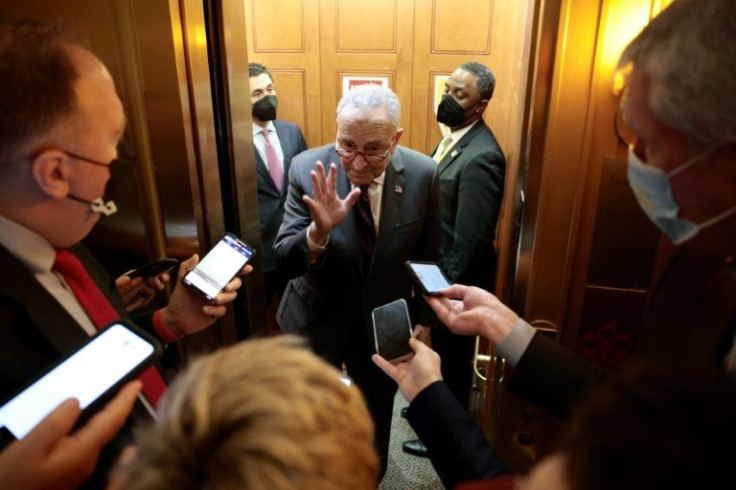Senate Approves Fast-track Process To Avert US Debt Crisis
US senators voted Thursday to create a one-time law allowing Democrats to lift the nation's borrowing authority and avert a disastrous credit default without requiring votes from the opposition Republicans.
The move allows Democratic-controlled Congress to lift the debt limit by a specific dollar amount with a simple majority in both chambers, meaning it can pass into law without Republican fingerprints on the hike.
"We still have a few more steps to take before we completely resolve this matter, but I am optimistic that after today's vote we will be on a glide path to avoid a catastrophic default," Democratic Senate Majority Leader Chuck Schumer said.
A debt limit increase would normally require 60 votes in the 50-50 split Senate, meaning Republicans, who are always keen to project themselves as fiscal conservatives, would have to chip in with votes in favor.
But the new law approved Thursday means the body can now pass solely with support from every Democrat and a tie-breaking "yea" from Vice President Kamala Harris.
Meanwhile, the Republicans can essentially stand on the sidelines, not blocking the Democrats but offering no votes themselves to raise the limit.
The compromise caps weeks of fraught negotiations and comes just days ahead of the deadline for the debt limit being reached.
Without action, the United States would no longer have been able to meet its debt repayment obligations soon after next Wednesday.
America spends more money than it brings in through taxation, so it borrows money by issuing government bonds, seen as among the world's safest investments.

Around 80 years ago, lawmakers introduced a limit on how much federal debt could be accrued.
The ceiling has been lifted dozens of times to allow the government to meet its spending commitments -- usually without drama and with the support of both parties -- and stands at around $29 trillion.
The final simple-majority House and Senate votes on raising the debt ceiling itself are expected early next week.
Democratic leaders spent weeks underlining the havoc that a default would have wrought, including the loss of an estimated six million jobs and $15 trillion in household wealth.
The battle has been a bruising affair for Mitch McConnell, who leads the Republicans in the Senate and has come under heavy fire from his own side and from former president Donald Trump for helping Democrats stave off the crisis.
The Kentucky senator shocked Washington in the summer when he demanded that Democrats use a complicated and time-consuming legislative process called "reconciliation" to raise the borrowing cap on their own.
His plan was to force Democrats to increase the debt by a specific number without any Republican involvement at all, and then hammer them for out-of-control spending on the campaign trail.
Instead of gumming up the process, McConnell agreed in the end to the equally convoluted but much quicker approach playing out now.
Schumer thanked McConnell, describing their talks to reach a deal as "fruitful, candid and productive."
© Copyright AFP 2024. All rights reserved.





















